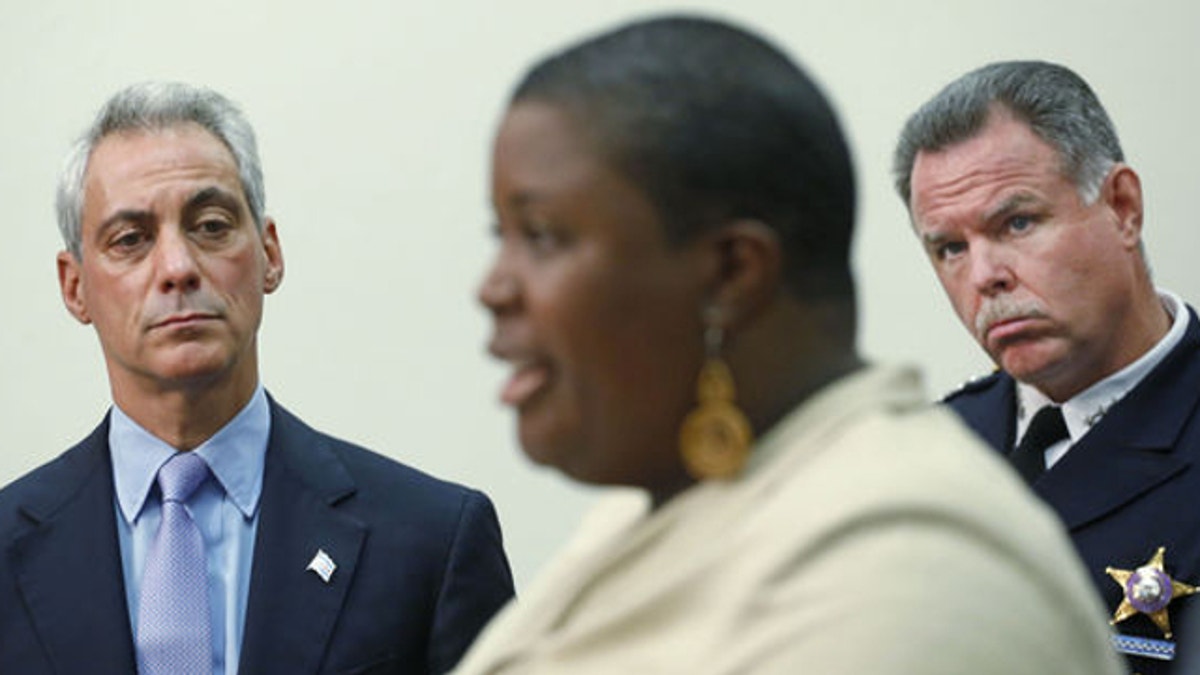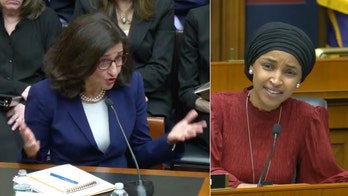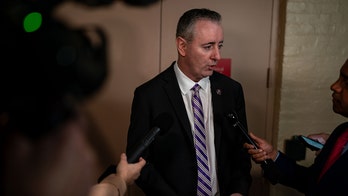
Oct. 15, 2013: Chicago Mayor Rahm Emanuel, and Police Superintendent Garry McCarthy listen as Cleopatra Pendleton, the mother of slain teen Hayida Pendelton speaks at a news conference in Chicago. (AP)
The National Rifle Association is stepping up its campaign against a proposed gun control measure in Illinois that supporters argue will help combat and prevent street violence by increasing penalties for gun crimes.
The bill, sponsored by Democratic state Rep. Mike Zalewski, calls for more time behind bars for possessing illegal weapons. It increases penalties for unlawful use of weapons, including by felons or gang members. It would make probation less likely, imposing minimum prison sentences of three years in many cases. It would also require that offenders serve at least 85 percent of their sentences, up from 50 percent.
The NRA's Institute for Legislative Action wrote in a website post that the bill will jeopardize concealed carry in Illinois by imposing tough penalties for individuals who carry a firearm without a concealed-carry permit or firearm owner's identification card.
"This specific provision incorrectly targets otherwise law-abiding citizens, rather than deterring violent criminals with harsher penalties," the group said in an Oct. 10 statement.
The proposal — which could come up next week when state lawmakers return to the Capitol — has also been met with opposition from prison groups who cite concerns about putting more inmates into an already crowded prison system, a move some estimate could cost tens of millions of dollars more a year.
Those same concerns could mean a tough sell to Republicans and some downstate Democrats. The NRA's lobbying arm has repeatedly urged its supporters in Illinois to contact their state representatives and urge them to oppose the law.
Meanwhile, Chicago Mayor Rahm Emanuel on Tuesday vowed to lobby lawmakers on the measure Emanuel, Police Superintendent Garry McCarthy and Cook County State's Attorney Anita Alvarez said the measure targets repeat offenders and those who own guns illegally.
At least 108 people who've been accused of gun crimes in Chicago this year would have been behind bars if the bill was law, police estimate. Emanuel said tougher laws are part of the equation to fight violence, along with police strategies and community involvement.
"The weak link in this system is our gun laws," Emanuel said at a press conference. "The weakest link is that they're not strong enough."
Emanuel has pushed for the legislation in the wake of a shooting at a park last month that injured 13 people. He said he'd meet with and call lawmakers to talk about the bill, along with possible travel to Springfield.
But prison watchdog group John Howard Association said there are studies showing that longer sentences don't deter crimes and that funding is tight for programs to reduce recidivism and overcrowding.
"There is nothing magical about a prison cell. It can restrain a person who poses a violent risk to public safety, but it is extremely expensive and difficult to try to make it do anything else," said the group's executive director John Maki in a statement.
Todd Vandermyde, a lobbyist for the NRA, said the group disagrees with the three-year minimums for first-time offenders. He blasted Emanuel for not doing enough to combat city violence.
"The mayor is looking for a public relations solution to a crime problem that he can't get his hands around," he said.
Homicides are down in Chicago this year in comparison with 2012. Emanuel has pushed multiple police strategies to lower homicide rates.
Emanuel, McCarthy and Alvarez spoke at City Hall surrounded by family members of those affected by violence, including the mother of 15-year-old Hadiya Pendleton, who was fatally shot near the Chicago home of President Barack Obama days after she performed in his January inauguration festivities.
Zalewski, the bill's sponsor, said he hopes to bring the bill for a vote in the coming weeks. The measure won strong support in a House committee earlier this year, but floor action wasn't taken. Since then, Illinois has approved the concealed carry of weapons, which Zalewski said provides lawmakers clarity about gun laws.
House Speaker Michael Madigan is in favor of the legislation. Senate President John Cullerton said he's open to it and has been in touch with Emanuel.
Senate Republican Leader Christine Radogno said the approach would have "considerable cost" and could sweep up otherwise law-abiding citizens who make a mistake, but he said there was room for discussion.
House Republican Leader Jim Durkin said Chicago officials had reached out to him but he's undecided.
"Everybody is sickened by the daily shootings that occur in the city of Chicago," he said. "The proposition has some merit."
The Associated Press contributed to this report.




